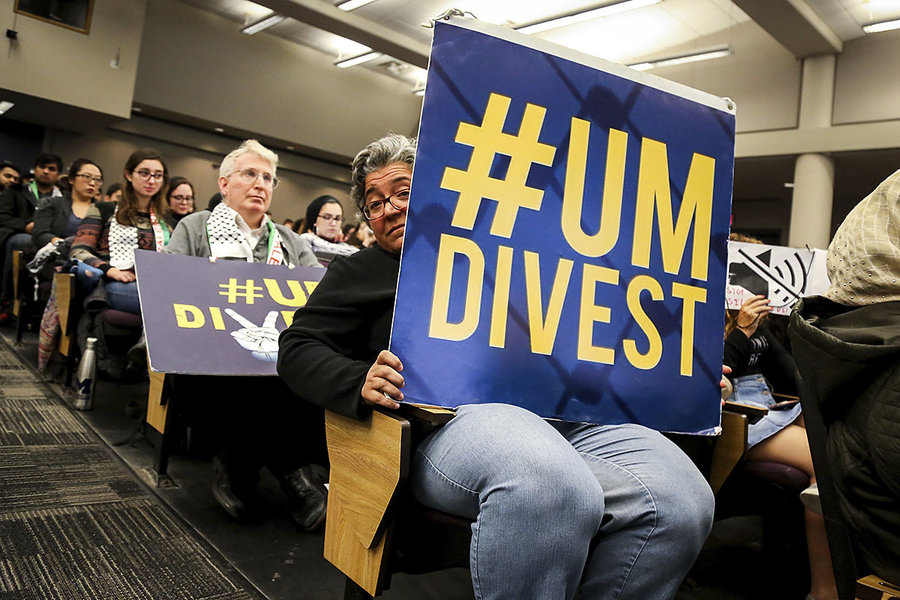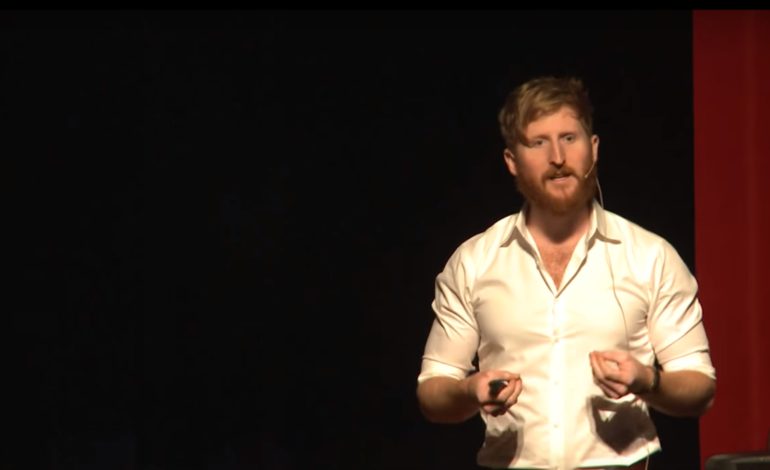ANN ARBOR – The BDS [Boycott, Divest, Sanctions] movement has become a source for discomfort on several levels, including American institutions in academia.
After University of Michigan associate professor of American culture John Cheney-Lippold refused to write a recommendation letter for a student who wanted to study in Israel, citing his support for BDS, the university punished him by taking away his eligibility for a merit pay increase for the 2018-19 academic year.
The university has also frozen his sabbatical eligibility until the fall of 2020. Cheney-Lippold had scheduled a sabbatical for winter 2019.
The American Association of University Professors [AAUP] urged U of M President Mark Schlissel to rescind the sanctions against Cheney-Lippold, noting that it did not follow the AAUP’s recommended institutional regulations on academic freedom and tenure.
U of M College of Literature, Science & Arts Interim Dean Elizabeth Cole stated in a letter to Cheney-Lippold that his “behavior was inappropriate and will not be tolerated.”
Cole’s letter also said, “In the future, a student’s merit should be your primary guide for determining how and whether to provide a letter of recommendation. You are not to use student requests for recommendations as a platform to discuss your personal political beliefs.”
This letter was obtained by The Ann Arbor News through the Freedom of Information Act.
David Palumbo-Liu, a Louise Hewlett Nixon professor at Stanford University, wrote about this issue that, “disciplining faculty who refuse to write letters for programs that have discriminatory practices contradicts the self-declared ethos of the University of Michigan, which strongly prohibits discrimination against any individual ‘because of race, color, national origin, age, marital status, sex, sexual orientation, gender identity, gender expression, disability, religion, height, weight or veteran status, except as allowed by the need for bona fide occupational qualifications.’”
He also added that it’s odd that Cole is, “happy to dismiss a person who acts according to that ethos in protesting Israel’s discriminatory practices against Palestinians and indeed against anyone critical of its regime.”
In an open letter to U of M, Juan Cole, the Richard P. Mitchell collegiate professor of history at the university, calls it a “key First Amendment issue” because, “any of us who teach Middle East or social movements might have occasion to discuss BDS in the classroom.”
Cole also wrote that, “Cheney-Lippold also went into his classroom after the social media furor broke out and found his undergraduates puzzled and confused, so [he] opened up some time to discuss the issues. He is also being sanctioned for that.”
He added that Cheney-Lippold’s position is one adopted by the Democratic Socialists of America, a “significant caucus in the Democratic Party, and is not an outlier ethically.”
The punishment for displaying solidarity with the BDS movement in academic setting hasn’t stopped with Cheney-Lippold.

Protesters during a U of M student government body meeting hold up signs in support of divestment from companies that do business with Israel, Nov. 14, 2017 – Photo by AP
Lara Alqasem, 22, an American student of Palestinian background who went to Israel to study with a valid visa was denied entry and is still in the custody of Israeli authorities for alleged involvement with BDS.
“If Lara Alqasem declares clearly and explicitly that she erred in the past, we will reconsider our position regarding her entry to Israel,” Gilad Erdan, Israel’s minister for public security and strategic affairs, stated about Alqasem’s denial of entry.
“The Israelis have clearly responded to BDS by themselves boycotting anybody who might be participating in BDS,” University of Detroit Mercy law Professor Amer Zahr told The AANews. “BDS has been a very effective strategy for keeping the debate alive about Palestine and highlighting Israel’s daily violations of human rights.”
Zahr said the resistance against the BDS is “very much, just like apartheid South Africa and the Jim Crow South in the 1950’s”, neither of which liked being boycotted.
“Boycotting is not a new concept,” he said. “It is a part of civil disobedience and non-violent civil rights movement for a very long time. Palestinians are taking on the position of civil rights in America and the anti-aparthied of South Africa, but we’re being punished for speaking our minds.”
He said that’s expected of Israel, but U of M is another matter.
“What we really don’t expect is getting punished for speaking our mind by our own government and that is what U of M is doing,” he said. “It’s a public school.”
Zahr also said Michigan has a law which states it won’t contract with people who participate in BDS.
“But to try to have the government actually punish people for participating in it is actually dangerous and unconstitutional,” he said.
Zahr also said the Supreme Court has said before that boycotts deserve the “highest form of protection of first amendment rights.”
Some of these anti-BDS laws have been struck down by states like Kansas and Arizona.
“We know that it’s unconstitutional and won’t fly, but they don’t want a debate,” he said of the pro-Israel lobby. “And now with social media, it’s hard for the pro-Israel lobby to control everything. When they can’t control anything, the debate finally starts to center around the truth.
“BDS is a much bigger threat to Israel than any violent organization,” he added.






Leave a Reply